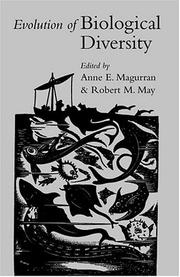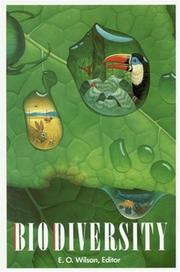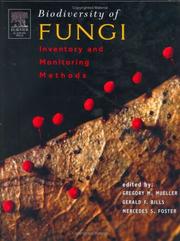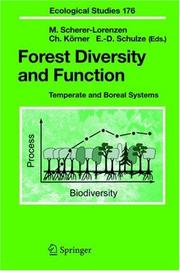| Listing 1 - 9 of 9 |
Sort by
|
Book
ISBN: 3934055052 9783934055056 Year: 2000 Publisher: S.l. IFOAM
Abstract | Keywords | Export | Availability | Bookmark
 Loading...
Loading...Choose an application
- Reference Manager
- EndNote
- RefWorks (Direct export to RefWorks)
Nature conservation --- Biodiversity --- Organic farming --- RBINS-SYMPOSIUM --- Conferences - Meetings --- Nature conservation - Congresses. --- Biodiversity - Congresses. --- Organic farming - Congresses.

ISBN: 0198503040 0198503059 9780198503040 9780198503057 Year: 1999 Publisher: Oxford Oxford University Press
Abstract | Keywords | Export | Availability | Bookmark
 Loading...
Loading...Choose an application
- Reference Manager
- EndNote
- RefWorks (Direct export to RefWorks)
Evolution. Phylogeny --- General ecology and biosociology --- Biological diversity --- Evolution (Biology) --- Natural selection --- Ecology --- Variation (Genetics) --- Evolution --- Selection (Genetics) --- Biodiversity --- ZV Evolution --- Darwinism --- Selection, Natural --- Genetics --- Variation (Biology) --- Biological invasions --- Heredity --- Biodiversity - Congresses --- Evolution (Biology) - Congresses --- Natural selection - Congresses

ISBN: 0309037395 0309037832 9786610221516 1280221518 030956736X 0585047227 9780309567367 9780585047225 9780309037396 9780309037839 Year: 1988 Publisher: Washington, D.C. National Academy Press
Abstract | Keywords | Export | Availability | Bookmark
 Loading...
Loading...Choose an application
- Reference Manager
- EndNote
- RefWorks (Direct export to RefWorks)
General ecology and biosociology --- Environmental protection. Environmental technology --- -Biological diversification --- Biocomplexity --- Ecological heterogeneity --- Numbers of species --- -574.472 Biodiversity --- Biodiversity conservation -- Congresses. --- 575.858 --- -Biological diversity --- Species. Speciation --- 575.858 Species. Speciation --- Biodiversity -- Congresses. --- Biodiversity conservation --- Biodiversity --- Earth & Environmental Sciences --- Ecology --- 574.472 --- 574.472 Biodiversity --- #WPLT:syst --- Biological diversity --- Environmental Sciences and Forestry. Nature Management --- Biodiversity. --- BIOSPHERE --- CONSERVATION --- Monograph --- Biosphere. --- Biological diversification --- Biotic diversity --- Diversification, Biological --- Diversity, Biological --- Biology --- Life (Biology) --- Planets --- Gaia hypothesis --- Geobiology --- Biological diversity - Congresses --- Biodiversity conservation - Congresses --- Biodiversity - Congresses --- BIOLOGICAL DIVERSITY --- PRESERVATION --- ANTHROPOGENIC EFFECTS --- NATURAL RESOURCE CONSERVATION --- GERMPLASM CONSERVATION --- RESTORATION --- POLICIES --- MEETINGS --- ECOLOGY

ISBN: 0125095511 9780125095518 9786610961429 1280961422 0080470262 9780080470269 Year: 2004 Publisher: Amsterdam ; London : Elsevier Academic Press,
Abstract | Keywords | Export | Availability | Bookmark
 Loading...
Loading...Choose an application
- Reference Manager
- EndNote
- RefWorks (Direct export to RefWorks)
Biodiversity of Fungi is essential for anyone collecting and/or monitoring any fungi. Fascinating and beautiful, fungi are vital components of nearly all ecosystems and impact human health and our economy in a myriad of ways. Standardized methods for documenting diversity and distribution have been lacking. A wealth of information, especially regrading sampling protocols, compiled by an international team of fungal biologists, make Biodiversity of Fungi an incredible and fundamental resource for the study of organismal biodiversity. Chapters cover everything from what i
Fungi --- Mycological surveys --- Biodiversity --- Variation --- Sampling --- Dispersal --- Fungal kingdom --- Fungus kingdom --- Funguses --- Mycobiota --- Mycota --- Cryptogams --- Mycology --- Fungal inventories --- Fungal surveys --- Fungus inventories --- Fungus surveys --- Mycofloral surveys --- Ecological surveys --- Fungi - Congresses --- Fungi - Variation - Congresses --- Mycological surveys - Congresses --- Fungi - Sampling - Congresses --- Biodiversity - Congresses
Book
ISBN: 9783319199320 3319199315 9783319199313 3319199323 Year: 2015 Publisher: Cham : Springer International Publishing : Imprint: Springer,
Abstract | Keywords | Export | Availability | Bookmark
 Loading...
Loading...Choose an application
- Reference Manager
- EndNote
- RefWorks (Direct export to RefWorks)
This book presents 20 selected contributions to the 18th Evolutionary Biology Meeting, which took place in September 2014 in Marseille. They are grouped under the following major themes: · Genotype to Phenotype · Genetic Mechanisms of Diversification · Evolutionary Mechanisms · Speciation and Biodiversity The aims of these annual meetings in Marseille are to bring together leading evolutionary biologists and other scientists who employ evolutionary biology concepts, e.g. for medical research, and to promote the exchange of ideas and encourage interdisciplinary collaborations. Offering an up-to-date overview of recent advances in the field of evolutionary biology, this book represents an invaluable source of information for scientists, teachers and advanced students.
Life Sciences. --- Evolutionary Biology. --- Developmental Biology. --- Animal Genetics and Genomics. --- Plant Genetics & Genomics. --- Life sciences. --- Developmental biology. --- Evolution (Biology). --- Plant breeding. --- Animal genetics. --- Sciences de la vie --- Biologie du développement --- Evolution (Biologie) --- Plantes --- Génétique animale --- Amélioration --- Biodiversity -- Congresses. --- Evolution (Biology) -- Congresses. --- Genetics -- Congresses. --- Evolution --- Biology --- Health & Biological Sciences --- Evolution (Biology) --- Genetics --- Biodiversity --- Evolutionary biology. --- Plant genetics. --- Plant Genetics and Genomics. --- Plants --- Development (Biology) --- Growth --- Ontogeny --- Animal evolution --- Animals --- Biological evolution --- Darwinism --- Evolutionary biology --- Evolutionary science --- Origin of species --- Biological fitness --- Homoplasy --- Natural selection --- Phylogeny
Book
ISBN: 9048181623 1402095813 9786612068812 1282068814 1402095821 Year: 2009 Publisher: Dordrecht, the Netherlands : Springer,
Abstract | Keywords | Export | Availability | Bookmark
 Loading...
Loading...Choose an application
- Reference Manager
- EndNote
- RefWorks (Direct export to RefWorks)
Ancient lakes are exceptional freshwater environments that have continued to exist for hundreds of thousands of years. They have long been recognized as centres of biodiversity and hotspots of evolution. During recent decades, speciation in ancient lakes has emerged as an important and exciting topic in evolutionary biology. The contributions in this volume deal with patterns and processes of biological diversification in three prominent ancient lake systems. Of these, the famous East African Great Lakes already have a strong tradition of evolutionary studies, but the two other systems have so far received much less attention. The exceptional biodiversity of the European sister lakes Ohrid and Prespa of the Balkans has long been known, but has largely been neglected in the international literature until recently. The rich biota and problems of its evolution in the two central lake systems on the Indonesian island of Sulawesi, in turn, have only lately started to draw scientific attention. This volume aims at deepening the awareness of the unusual biological diversity in ancient lakes in general, and of the role of these lakes as natural laboratories for the study of speciation and diversification in particular. It should stimulate further research that will lead to a better understanding of key evolutionary processes in these lakes, and to knowledge that might help in mitigating the deterioration of their diversity in the future.
Freshwater biodiversity -- Congresses. --- Lake ecology -- Congresses. --- Species -- Congresses. --- Ecology --- Earth & Environmental Sciences --- Species --- Lakes --- Lake ecology --- Biodiversity --- Speciation (Biology) --- Life sciences. --- Biodiversity. --- Aquatic ecology. --- Evolutionary biology. --- Life Sciences. --- Evolutionary Biology. --- Freshwater & Marine Ecology. --- Biology --- Genetics --- Hybridization --- Organisms --- Evolution (Biology). --- Aquatic biology. --- Animal evolution --- Animals --- Biological evolution --- Darwinism --- Evolutionary biology --- Evolutionary science --- Origin of species --- Evolution --- Biological fitness --- Homoplasy --- Natural selection --- Phylogeny --- Biological diversification --- Biological diversity --- Biotic diversity --- Diversification, Biological --- Diversity, Biological --- Biocomplexity --- Ecological heterogeneity --- Numbers of species --- Hydrobiology --- Water biology --- Aquatic sciences --- Aquatic ecology . --- Aquatic biology
Book
ISBN: 9400731914 9048190878 9786613001757 9048190886 1283001756 Year: 2010 Publisher: New York : Springer,
Abstract | Keywords | Export | Availability | Bookmark
 Loading...
Loading...Choose an application
- Reference Manager
- EndNote
- RefWorks (Direct export to RefWorks)
Ponds are an exceptional freshwater resource around the world and represent thirty percent of the global surface area of standing water. Furthermore, the millions of ponds which exist exhibit a particularly high biodiversity and have a high potential for ecosystem functions and services. Despite these impressive features, ponds face many threats from a variety of human activities and receive little or no protection under European and national legislation. Consequently, there is an urgent need to protect, consolidate and increase the pond resource in Europe. In order to achieve these objectives, the European Pond Conservation Network (EPCN) was launched 2004 in Geneva. Its aim is to promote the awareness, understanding and conservation of these small water bodies in the European landscape. This volume of “Developments in Hydrobiology” presents a selection of 31 papers presented during EPCN conferences held in 2006 in France (Toulouse) and in 2008 in Spain (Valencia). They represent a diverse collection of themes from across the continent and North Africa and present new and original insights into topics as wide ranging as pond biodiversity; human disturbance; landscape ecology; ecological assessment and monitoring; practical management measures; ecological restoration; hydrology and climate change; invasive species and threatened species.
Aquatic biodiversity -- Congresses. --- Ecological assessment (Biology). --- Hydrology -- Congresses. --- Nature -- Effect of human beings on -- Congresses. --- Pond ecology -- Congresses. --- Ponds -- Europe -- Congresses. --- Ponds --- Pond ecology --- Aquatic biodiversity --- Ecological assessment (Biology) --- Nature --- Hydrology --- Earth & Environmental Sciences --- Ecology --- Effect of human beings on --- Nature conservation --- Conservation of nature --- Nature protection --- Protection of nature --- Conservation --- Life sciences. --- Biodiversity. --- Landscape ecology. --- Aquatic ecology. --- Plant ecology. --- Conservation biology. --- Ecology. --- Life Sciences. --- Plant Ecology. --- Freshwater & Marine Ecology. --- Conservation Biology/Ecology. --- Landscape Ecology. --- Conservation of natural resources --- Applied ecology --- Conservation biology --- Endangered ecosystems --- Natural areas --- Freshwater ecology --- Aquatic biology. --- Hydrobiology --- Water biology --- Aquatic sciences --- Biology --- Botany --- Plants --- Biological diversification --- Biological diversity --- Biotic diversity --- Diversification, Biological --- Diversity, Biological --- Biocomplexity --- Ecological heterogeneity --- Numbers of species --- Phytoecology --- Vegetation ecology --- Aquatic ecology . --- Ecology . --- Balance of nature --- Bionomics --- Ecological processes --- Ecological science --- Ecological sciences --- Environment --- Environmental biology --- Oecology --- Environmental sciences --- Population biology --- Aquatic biology --- Floristic ecology
Book
ISBN: 9401785651 940178566X Year: 2014 Publisher: Dordrecht : Springer Netherlands : Imprint: Springer,
Abstract | Keywords | Export | Availability | Bookmark
 Loading...
Loading...Choose an application
- Reference Manager
- EndNote
- RefWorks (Direct export to RefWorks)
Oceans cover more than 70% of earth and host a largely unknown marine biodiversity critical for future human beings. An improved knowledge of marine biodiversity at various scales (from genes to ecosystems) is required to facilitate building integrated scenarios and policies for a sustainable development as well as its conservation. Understanding species interactions, ecosystem functioning and dynamics, as well as biodiversity uses is presently a scientific challenge. Conservation of marine biodiversity is now a worldwide priority emphasized by several international conventions (UN, CBD..) and a key target for European policies and national strategies. This book provides a comprehensive review of the status and trends of marine biodiversity, an impact assessment of human activities and suggests a conceptual framework for relationships between biodiversity and human societies. Further research needs and priorities are identified to sustain the development of integrated scenarios and policies, considering a sustainable development as well as biodiversity conservation. The book is the product of a collective scientific expertise based upon international experts originating from social, biological and ecological sciences. .
Biodiversity. --- Law of the sea. --- Marine biodiversity -- Congresses. --- Marine biodiversity conservation -- Congresses. --- Marine biodiversity --- Marine biodiversity conservation --- Earth & Environmental Sciences --- Ecology --- Marine Science --- Aquatic biodiversity. --- Aquatic biological diversity --- Diversity, Aquatic biological --- Life sciences. --- Conservation biology. --- Ecology. --- Wildlife. --- Fish. --- Sustainable development. --- Marine sciences. --- Freshwater. --- Social sciences. --- Life Sciences. --- Marine & Freshwater Sciences. --- Sustainable Development. --- Conservation Biology/Ecology. --- Fish & Wildlife Biology & Management. --- Social Sciences, general. --- Biodiversity --- Marine Sciences. --- Wildlife management. --- Behavioral sciences --- Human sciences --- Sciences, Social --- Social science --- Social studies --- Civilization --- Animal populations --- Game management --- Management, Game --- Management, Wildlife --- Plant populations --- Wildlife resources --- Natural resources --- Wildlife conservation --- Nature conservation --- Development, Sustainable --- Ecologically sustainable development --- Economic development, Sustainable --- Economic sustainability --- ESD (Ecologically sustainable development) --- Smart growth --- Sustainable development --- Sustainable economic development --- Economic development --- Ocean sciences --- Aquatic sciences --- Biological diversification --- Biological diversity --- Biotic diversity --- Diversification, Biological --- Diversity, Biological --- Biology --- Biocomplexity --- Ecological heterogeneity --- Numbers of species --- Management --- Environmental aspects --- Ecology . --- Fish --- Pisces --- Aquatic animals --- Vertebrates --- Fisheries --- Fishing --- Ichthyology --- Balance of nature --- Bionomics --- Ecological processes --- Ecological science --- Ecological sciences --- Environment --- Environmental biology --- Oecology --- Environmental sciences --- Population biology --- Fresh waters --- Freshwater --- Freshwaters --- Inland water --- Inland waters --- Water

ISBN: 3540221913 9783540221913 364206065X 3540265996 Year: 2005 Publisher: Berlin, Heidelberg : Springer Berlin Heidelberg : Imprint: Springer,
Abstract | Keywords | Export | Availability | Bookmark
 Loading...
Loading...Choose an application
- Reference Manager
- EndNote
- RefWorks (Direct export to RefWorks)
One of the central research themes in ecology is evaluating the extent to which biological richness is necessary to sustain the Earth's system and the functioning of individual ecosystems. In this volume, for the first time, the relationship between biodiversity and ecosystem processes in forests is thoroughly explored. The text examines the multiple effects of tree diversity on productivity and growth, biogeochemical cycles, animals, pests, and disturbances. Further, the importance of diversity at different scales, ranging from stand management to global issues, is considered. The authors provide both extensive reviews of the existing literature and own datasets. The volume is ideally suited for researchers and practitioners involved in ecosystem management and the sustainable use of forest resources.
Issue --- Forest biodiversity --- Taiga ecology --- Biodiversité forestière --- Ecologie des taïgas --- Forest biodiversity -- Congresses. --- Forest ecology -- Congresses. --- Taiga ecology -- Congresses. --- temperate regions --- boreal forests --- Biodiversité forestière --- Ecologie des taïgas --- Diversity, Forest biological --- Forest biological diversity --- Forest diversity --- Boreal forest ecology --- Life sciences. --- Geobiology. --- Biodiversity. --- Ecosystems. --- Plant ecology. --- Forestry. --- Geoecology. --- Environmental geology. --- Life Sciences. --- Plant Ecology. --- Geoecology/Natural Processes. --- Biogeosciences. --- Forest ecology --- Geoecology --- Environmental protection --- Physical geology --- Forest land --- Forest lands --- Forest planting --- Forest production --- Forest sciences --- Forestation --- Forested lands --- Forestland --- Forestlands --- Forestry --- Forestry industry --- Forestry sciences --- Land, Forest --- Lands, Forest --- Silviculture --- Sylviculture --- Woodlands --- Woods (Forests) --- Agriculture --- Natural resources --- Afforestation --- Arboriculture --- Logging --- Timber --- Tree crops --- Trees --- Botany --- Plants --- Ecology --- Biocenoses --- Biocoenoses --- Biogeoecology --- Biological communities --- Biomes --- Biotic community ecology --- Communities, Biotic --- Community ecology, Biotic --- Ecological communities --- Ecosystems --- Natural communities --- Population biology --- Biological diversification --- Biological diversity --- Biotic diversity --- Diversification, Biological --- Diversity, Biological --- Biology --- Biocomplexity --- Ecological heterogeneity --- Numbers of species --- Earth sciences --- Biosphere --- Biosciences --- Sciences, Life --- Science --- Biodiversity --- Forests and forestry. --- Endangered ecosystems. --- Ecology. --- Balance of nature --- Bionomics --- Ecological processes --- Ecological science --- Ecological sciences --- Environment --- Environmental biology --- Oecology --- Environmental sciences --- Threatened ecosystems --- Biotic communities --- Nature conservation
| Listing 1 - 9 of 9 |
Sort by
|

 Search
Search Feedback
Feedback About UniCat
About UniCat  Help
Help News
News